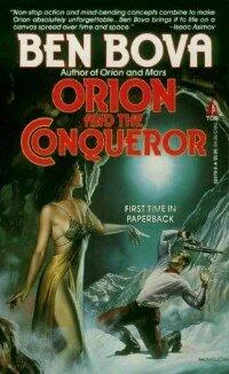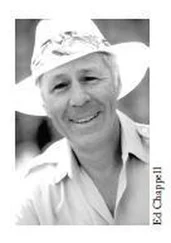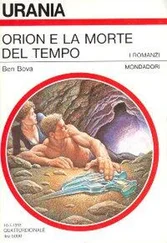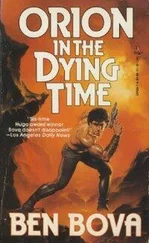“At Troy?”
“At Troy. I was befriended by Odysseus and made a member of his house.”
“That was a thousand years ago!”
“It was in an earlier life.”
He grinned nervously. “You’ve been talking to that Hindi, haven’t you? He believes in reincarnation.”
“I have lived many lives. One of them was at Troy. I saw Achilles kill Hector. I saw Achilles take his own life when an arrow wound crippled him.”
Alexandros shook his head like a man trying to rid himself of a bad dream. “Orion, I think you have taken too many blows on your head.”
I knew he believed what I had told him but did not want to admit it, even to himself. So I said merely, “Perhaps so. Perhaps it was all a dream.”
“Certainly it was.”
We fell silent as we marched on to the house of Demosthenes. It was not as grand as Aeschines’ house, where once again we were staying, but it was a large and handsome house with a whole detachment of uniformed city constables standing guard before it. Like Aeschines, Demosthenes was a lawyer. It must have been a profession that paid very well, I thought, judging from their homes.
Demosthenes knew we were coming, of course. His servants bowed us in through the front gate. He received us in the central courtyard, where gnarled fig trees provided shade by day. Now, with night’s shadows creeping across the city, the courtyard was lit by lanterns hung from the trees’ twisting limbs.
He stood as Alexandros and I approached, his eyes going wide at the sight of his shield. Our six-man guard stood out by the house’s front gate, with the constables’ detachment, within shouting range.
“I believe this is yours,” said Alexandros, gesturing me to lay it on the ground at Demosthenes’ feet. The man seemed to have aged ten years in the few days since Chaeroneia. His face was lined, a pallid gray, and his beard was ragged.
He stared down at the shield. It was unscratched. He had never come close enough to the fighting to have it marred.
“Wh-what do you w-w-want of me?” He could not look directly at Alexandros.
“Only to tell you that you have nothing to fear from Philip, King of the Macedonians. Despite all that you have said, despite your personal insults, he has instructed me to tell you that he bears you no ill will and he will not harm you in any way.”
Demosthenes looked up then, his eyes more puzzled than surprised.
“But let me add this, Demosthenes,” said Alexandros. “I, Alexandros, will one day be king of the Macedonians. And on that day you can begin to number the hours left to your miserable, lying, traitorous heart.”
“T-traitorous? Whom have I b-betrayed?”
“The thousands of your fellow Athenians who died at Chaeroneia while you flung your shield and weapons away and ran to save your filthy neck. The brave Sacred Band of the Thebans, who fought to the last man because you , bought by Persian gold, talked them into making war against us. The people of your own city who trusted you to lead them to victory and now bless Philip’s name for his magnanimity.”
Demosthenes was trembling, but he managed to choke out, “So y-you intend to k-k-kill me once you g-gain the throne.”
“You can run to the Great King, your secret master, but it will do you no good. Hide at the ends of the earth and I will find you,” Alexandros snarled.
“My secret master?” Some of the old fire seemed to rekindle in Demosthenes. “I have no m-master except the democracy of Athens!”
“You deny you took money from the Persians?”
“Of course not. I would have t-taken money from the dead souls in Hades if it would have helped to stop Philip.”
“Little good it did you.”
“Athens still stands,” he challenged.
“Your people love Philip now. If you showed yourself on the streets they would no doubt tear you to pieces.”
“Yes. Likely they would. Today. Tomorrow. But in time, perhaps a few weeks, perhaps a few months, they will come back to me.”
Alexandros laughed.
And Demosthenes scowled at him. “You have no idea of how the p-people actually behave, do you? This is a democracy, princeling. Loyalty is not forced. Obedience is not coerced. Where the people are free to make up their own minds, they change their minds often.” As before, the warmer his passion became the less he stuttered.
“Where the people are dazzled by demagogues,” Alexandros countered, “they can be led by their noses by the man who tells the biggest lies.”
“By the man who offers them the clearest vision of their own future,” Demosthenes corrected.
“The same thing,” said Alexandros.
“I will lead Athens again, sooner or later.”
Nodding, Alexandros agreed. “Yes, I understand that a democracy will follow the smoothest talker. I hope they do make you their leader again. I hope it happens when I am king. Then I will smash you once and for all.”
“You will try, I’m sure.”
Alexandros took a step closer to Demosthenes. “I will crush you like a grape, demagogue.” He scuffed a boot against the blue shield. “You’ll need more than that to protect you, next time.”
If Alexandros thought that Pella would ignore his return, he reckoned without his mother. We were only a small band: Alexandros and his Companions, and those of us of the royal guard who had been assigned to them. With the servants and horse handlers and mule drivers and all we came to fewer than a hundred and fifty men.
Yet the streets of Pella were decked with flowers when we returned. Crowds lined the streets as we made our way to the palace, cheering us and throwing even more flowers. Young women ran to us as we rode through the streets to beam smiles up at us and touch us with their outstretched fingertips. Boys pranced along beside our horses, proud to pretend they were part of us.
At the head of the palace steps, at the end of our procession, stood Olympias, resplendent in a red gown that swirled to the ground, her hair decked with garlands, her eyes bright with victory.
The king was nowhere in sight.
We were feted at a royal banquet. Even those of us in the guard were invited to recline on couches in the main dining hall and be served by comely young women and smooth-cheeked young men. Alexandros was up at the head of the hall, his mother beside him. Much wine was poured and most of the men became quite drunk. But neither Alexandros nor his mother did more than sip at their goblets. I drank freely, knowing that I never got drunk. Something in my body burned away the alcohol almost as quickly as I consumed it.
“Where is the king?” I asked Ptolemaios, on the couch next to mine. He was fondling one of the serving girls. Thais had elected to remain in Athens a while; he had complained loudly on the trip back to Pella that the woman was trying to drive him mad. And succeeding.
“Who cares?” he said. Then he returned to nibbling at the serving girl. She could not have been more than fifteen, but that was well past marriageable age among the Macedonians.
The dinner became rowdier. The young men began tossing morsels of food at one another. The more the wine flowed the more uproariously they laughed and bellowed obscene jokes back and forth. Olympias, up on the dais at the head of the hall, seemed to ignore it all as if she saw and heard nothing. She was deep in conversation with Alexandros, whose head was bent toward her.
At last they got up together and left the hall. Then the party became really raucous. Whole platters of food were hurled back and forth, goblets of wine sloshed through the air. Harpalos, the dour giant of the Companions, jumped atop a table and announced that he could make a roasted chicken fly as if it were alive. He pegged the seared bird halfway across the hall, narrowly missing dark-skinned Nearkos, who was intently slicing the skin off a peach in a single spiralling cut.
Читать дальше












